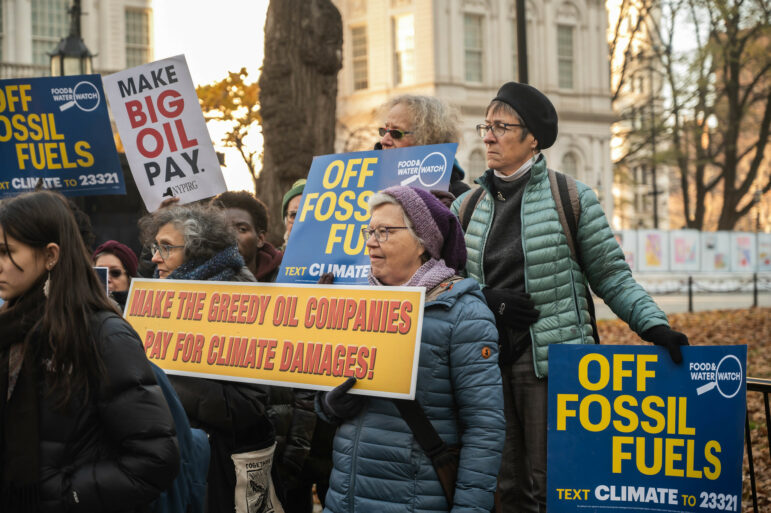More states are considering legislation to make the largest fossil fuel companies pay for the impacts of climate change, and activists hope a national effort will pressure Gov. Hochul to sign New York’s own superfund bill, which passed both houses earlier this year.

Kevin P. Coughlin / Office of Governor Kathy Hochul
Gov. Kathy Hochul touring storm damaged in upper Manhattan after Hurricane Ida in 2021. The Climate Change Superfund Act would make the largest corporate polluters help pay for the impacts of climate change, including damage wrought by extreme weather.As New York City’s climate week kicks off, environmental activists will convene Tuesday in front of Gov. Kathy Hochul’s Manhattan office to deliver over 85,000 petitions urging her to sign legislation to make fossil fuel polluters pay for climate damages.
While the bill passed both the State Senate and Assembly during this year’s legislative session, the governor has not yet signed it into law. Hochul, who has until the end of the calendar year to do so, plans to review the legislation, a spokesperson said.*
As pressure mounts for her signature, climate activists hope similar legislation introduced on the national level last month will nudge New York’s own bill across the finish line. The federal bill is backed by influential democrats in congress like Alexandria Ocasio-Cortez.
“This introduction serves to build momentum and awareness for the concept,” said Cassidy DiPaola, communications director at Fossil Free Media and spokesperson for the nation-wide Make Polluters Pay Campaign.
“This is about making the cost of the climate crisis into a kitchen table topic that’s part of everyday conversation more than anything else,” she added.
And the topic has started to catch on. Vermont became the first state in the nation to pass a climate Superfund law in May and legislators in Maryland and Massachusetts have considered similar bills.
On the federal level, the Polluters Pay Climate Fund Act would require the world’s largest fossil fuel companies doing business in the United States to pour $1 trillion over 10 years into a fund that will be used to address the impacts of climate change.
The money could be used, for instance, to clean up pollution, rebuild and upgrade infrastructure torn down by severe weather events and provide climate-related disaster assistance to the communities that need it most.
Covered companies include those responsible for emitting at least 1 billion tons of carbon dioxide into the atmosphere between 2000 and 2022. That means major oil companies like ExxonMobil, Chevron, Shell, and British Petroleum, as their greenhouse gas emissions are all well above the law’s benchmark, data shared with City Limits last year showed.
The amount each company is required to pay into the fund will be proportional to the amount of emissions they spewed above the 1 billion metric ton threshold.
The idea is to hold them accountable for past damages done to the atmosphere, the same way a company is asked to pay into a superfund when it has spilled oil or contaminated a river with hazardous waste.
Company reports that track fossil fuel production will help determine how many metric tons of greenhouse gasses the largest polluters launched into the atmosphere. A formula crafted by climate scientists and derived by the U.S. Environmental Protection Agency (EPA) will then be used to estimate how many metric tons were released annually.
“It’s critically important that scientists calculate these emissions and begin to quantify how much particular corporations have contributed to the impacts of climate change,” said Kathy Mulvey, the clean energy and climate accountability director at the Union of Concerned Scientists.
While Mulvey warns that the total economic costs of climate change are difficult to quantify, experts have been able to put a price tag on some of the damage.
The U.S government’s most recent report on climate change, known as the Fifth National Climate Assessment, puts the nationwide costs of climate-related extreme weather events at over $150 billion per year.

Ayman Siam/Office of NYC Comptroller
Climate activists with NYPIRG and Food & Watch Watch rallying for New York’s Climate Change Superfund Act in December 2023.This figure was used as a starting point for coming up with how much fossil fuel companies should pay into the climate superfund. Lawmakers calculated that if the U.S was hit with at least $100 billion a year in climate disasters, the tab would add up to at least $1 trillion in a decade’s time.
Lawmakers and environmentalists have been pushing for polluters to help foot the bill for these escalating damages since 2021, when they drafted a similar version of this legislation, though this is the first time it’s been introduced as a standalone bill. Maryland’s U.S. Senator Chris Van Hollen is sponsoring the legislation alongside New York Rep. Jerry Naddler.
For Nadler, the time to raise money for tackling the escalating issue of climate change is long overdue.
“We’ve noticed a mounting crisis. You see it in New York where we were breathing the ash from the wildfires in Canada [last year]. People see it and it’s certainly mounting almost exponentially in the last few years. It’s almost like we’ve reached a tipping point,” Nadler told City Limits.
Nadler says he doesn’t believe the legislation will become law in the near future “given the fact the Republicans are so negative on it” and currently have control of the house.
“But I do believe that, given the increasingly obvious severity of the crisis, we will pass this at some point, hopefully sooner rather than later. Obviously not in this Congress, but hopefully in the next one,” he added.
*This story has been updated to include a response from the governor’s office.
To reach the reporter behind this story, contact Mariana@citylimits.org. To reach the editor, contact Jeanmarie@citylimits.org
Want to republish this story? Find City Limits’ reprint policy here.








